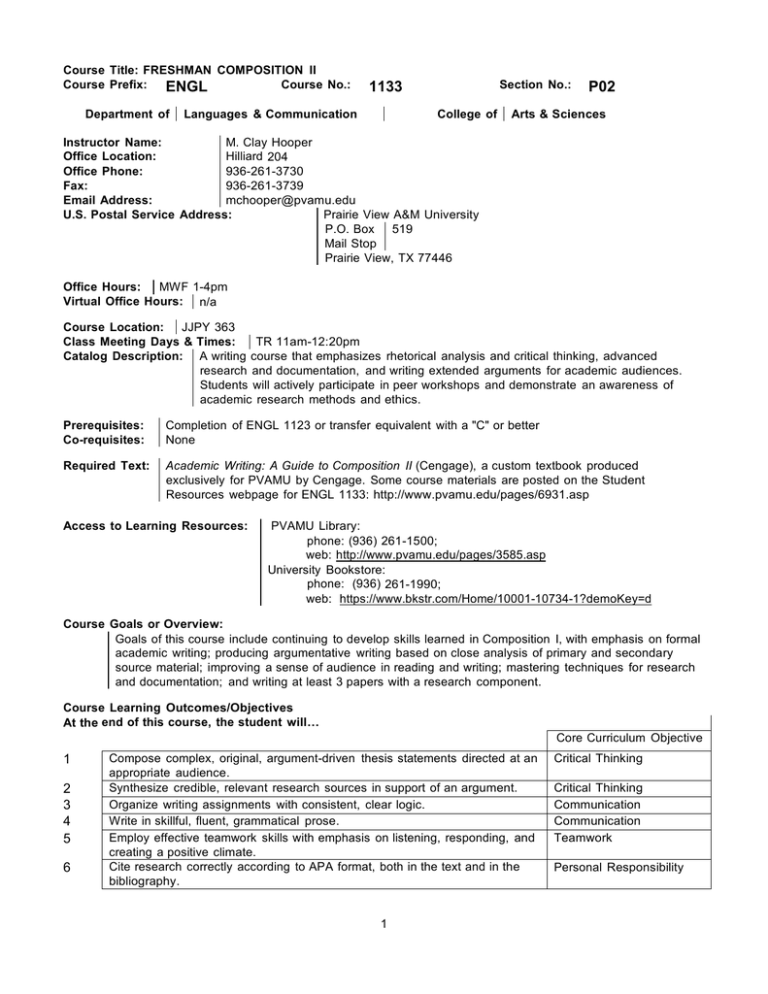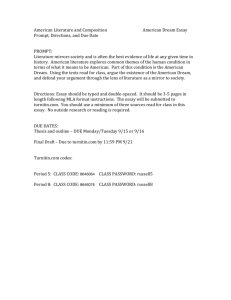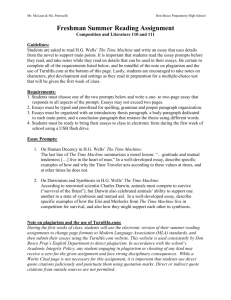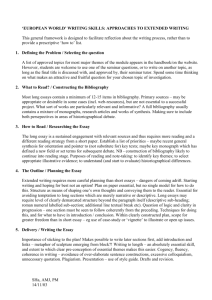ENGL 1133 P02
advertisement

Course Title: FRESHMAN COMPOSITION II Course Prefix: Course No.: ENGL Department of Section No.: 1133 Languages & Communication College of P02 Arts & Sciences Instructor Name: M. Clay Hooper Office Location: Hilliard 204 936-261-3730 Office Phone: Fax: 936-261-3739 Email Address: mchooper@pvamu.edu U.S. Postal Service Address: Prairie View A&M University P.O. Box 519 Mail Stop Prairie View, TX 77446 Office Hours: MWF 1-4pm Virtual Office Hours: n/a Course Location: JJPY 363 Class Meeting Days & Times: TR 11am-12:20pm Catalog Description: A writing course that emphasizes rhetorical analysis and critical thinking, advanced research and documentation, and writing extended arguments for academic audiences. Students will actively participate in peer workshops and demonstrate an awareness of academic research methods and ethics. Prerequisites: Co-requisites: Completion of ENGL 1123 or transfer equivalent with a "C" or better None Required Text: Academic Writing: A Guide to Composition II (Cengage), a custom textbook produced exclusively for PVAMU by Cengage. Some course materials are posted on the Student Resources webpage for ENGL 1133: http://www.pvamu.edu/pages/6931.asp Access to Learning Resources: PVAMU Library: phone: (936) 261-1500; web: http://www.pvamu.edu/pages/3585.asp University Bookstore: phone: (936) 261-1990; web: https://www.bkstr.com/Home/10001-10734-1?demoKey=d Course Goals or Overview: Goals of this course include continuing to develop skills learned in Composition I, with emphasis on formal academic writing; producing argumentative writing based on close analysis of primary and secondary source material; improving a sense of audience in reading and writing; mastering techniques for research and documentation; and writing at least 3 papers with a research component. Course Learning Outcomes/Objectives At the end of this course, the student will… Core Curriculum Objective 1 2 3 4 5 6 Compose complex, original, argument-driven thesis statements directed at an appropriate audience. Synthesize credible, relevant research sources in support of an argument. Organize writing assignments with consistent, clear logic. Write in skillful, fluent, grammatical prose. Employ effective teamwork skills with emphasis on listening, responding, and creating a positive climate. Cite research correctly according to APA format, both in the text and in the bibliography. 1 Critical Thinking Critical Thinking Communication Communication Teamwork Personal Responsibility Course Evaluation Methods This course will utilize the following instruments to determine student grades and proficiency of the learning outcomes for the course. EXAMS – On the multiple choice midterm and final examinations, students will demonstrate content mastery by correctly identifying advanced concepts and terms related to rhetoric and composition. They will demonstrate critical thinking by correctly identifying different types of analysis and their uses. They will demonstrate personal responsibility by correctly identifying instances of plagiarism and of proper source attribution according to APA guidelines for citation. PREWRITING ASSIGNMENTS – On the two prewriting assignments (each leading up to one of the major essays) students will demonstrate critical thinking by systematically analyzing the arguments and evidence within their source materials. They will demonstrate communication skills by articulating their own position and planning the structure of their major essays. ESSAYS – On the two formal essays, students will demonstrate critical thinking by developing sustained arguments based on academic, research-based analysis. They will demonstrate communication skills by organizing and developing their ideas clearly, sustaining a proper tone for an academic audience, and constructing clear and grammatically correct sentences. They will demonstrate personal responsibility by properly attributing ideas, information, and language to source material using APA citation guidelines. Daily Work & Participation – Students will demonstrate critical thinking, communication skills, personal responsibility, and teamwork on a variety of homework assignments, in-class exercises, and quizzes. For example, personal responsibility will be demonstrated on a “plagiarism worksheet” on which students will identify examples of plagiarism and proper APA-style source attribution. Students will demonstrate teamwork through group-oriented invention exercises and peer review exercises for each of the two major essays. GRADING MATRIX Instrument Annotated Bibliography I Essay 1: Research-Based Position Paper on Local Communities Annotated Bibliography II Essay 2: Research-Based Position Paper on Global Communities Daily Work & Participation (homework, drafts, peer reviews, quizzes, in-class participation) Midterm Exam Final Exam Total: 10% 25% 10% 30% 15% Value 100 250 100 300 150 5% 5% 100% points points points points points 50 points 50 points 1000 points GRADE DETERMINATION: A = 90 to 100% B = 80 to 89% C = 70 to 79% 900 to 1000 points 800 to 899 points 700 to 799 points D = 60 to 69% F = 0 to 59% 600 to 699 points 0 to 599 points Course Procedures Submission of Essays: All essays and prewriting assignments must be submitted through Turnitin.com by the deadline posted within the system. If your instructor also requires a hard copy, printed essays are due by the end of the class period. Essays will be accepted late for four calendar days after the due date with a deduction of 5% from your essay grade for each day. After four calendar days have passed, your essay will not be accepted and you will receive a grade of zero on the assignment. Be advised that Turnitin.com checks all submissions for plagiarism against web sources, periodical archives, and other student submissions. Access to Turnitin.com is free. Create a new account or sign using an existing account at: http://www.turnitin.com/en_us/home. Use the following Class ID and Class Enrollment Password to enroll in the proper section of the course (and please note that the Class ID is unique to this section of ENGL 1133). Class ID: 5950858 Class Enrollment Password: pvcomp ***NOTE: All of your work for this course must be original. You are not allowed to submit papers that you or anyone else has submitted for any other course or any other previous or concurrent section of composition. 2 Formatting Documents: Microsoft Word is the standard word processing tool used at PVAMU. If you’re using other word processors, be sure to use the “save as” tool and save the document in Rich Text Format (RTF). All essays must adhere to APA formatting style (including 1-inch margins and 12-point Times New Roman font). APA formatting guidelines are in your textbook and online at: http://owl.english.purdue.edu/owl/section/2/10/ Exam and Quiz Policy: The midterm and final exams should be taken as scheduled. No makeup examinations will be allowed except under documented emergencies (see Student Handbook). If you have a university event on the day of an exam, arrange to take it early. Pop quizzes are given throughout the semester over textbook readings and course concepts. If you are late or have an unexcused absence, you cannot make up a quiz. With an excused, documented absence, you may make up a quiz on the instructor's schedule. Extra Credit Policy: No extra credit will be available in any section of ENGL 1133, including this one. 3 COURSE SCHEDULE WEEK 1: COURSE INTRODUCTION T 1/15 R 1/17 In Class: Course introduction. For Class: Read “Academic Writing” (3-6; also available on course website) and first part of “Reading Argument” (11-24) In Class: Discuss rhetorical situations and characteristics of academic writing; receive Essay #1 assignment NOTE: Late registration ends Friday 1/18 WEEK 2: THE RHETORICAL SITUATION T 1/22 R 1/24 For Class: Read second part of “Reading Argument” (25-43) and “Social Connections” (268-70; also available through course website) For Class: Read “More Than Cherries” (237-43) In Class: Continue discussion of basic components of argument; discuss “Cherries” as example of academic writing about a local issue In Class: Discuss basic components of argument and identify them in “Social Connections” NOTE: Morning sections may be affected by the General Student Assembly WEEK 3: RHETORICAL ANALYSIS T 1/29 R 1/31 For Class: Read first part of “Reading Appeals” (45-65) and “Sample Annotated Bibliography I” (course website) For Class: Read “Somewhere in the Past: Clarksville’s School and Community Life” (253-56) In Class: Discuss logical appeals; introduce Annotated Bibliography I assignment In Class: Analyze structures of logic within the reading DUE: Topic proposal for Essay #1 NOTE: Wednesday 1/30 is the last day to drop a class without record (withdraw period begins Thursday, 1/31) WEEK 4: RESEARCH PROCESS T 2/5 R 2/7 For Class: Read “The Research Guide” (148-79) and “APA Documentation Style” (201-212) For Class: Read “Sample APA Position Paper” (221-27) In Class: Continue research workshop (class may meet in an alternative location) In Class: Research workshop and discussion of APA documentation guidelines (class may meet in an alternative location) DUE: Annotated Bibliography I (submit through Turnitin by 11:59pm on Friday, 2/8) Monday, February 11, 2013: 20th Class Day WEEK 5: PAPER STRUCTURE T 2/12 R 2/14 For Class: Skim argument types (131-46), “Isolated Communities: Hidden Dangers of MMORPGs” (235-37), “Paper Structure in Academic Writing” (124-29) For Class: Read “Integrating Sources” (180-96) and complete Plagiarism Worksheet (198-99) In Class: Continue discussion of simple-to-complex arrangement and begin discussing source integration In Class: Discuss simple-to-complex arrangement with reference to sample paper 4 WEEK 6: INTEGRATING SOURCES T 2/19 R 2/21 In Class: Continue discussion of source integration and workshop drafts of Essay #1 In Class: Peer review workshop (class may meet in an alternative location) DUE: Full draft of Essay #1 (submit through Turnitin by 11:59pm on Wednesday, 2/20) DUE: Peer review of another student’s Essay #1 draft (complete through Turnitin by 11:59pm on Monday, 2/25) WEEK 7: REVISION T 2/26 R 2/28 In Class: Revision workshop (issues related to structure and source integration) In Class: Revision workshop (issues related to source integration and proofreading) DUE: Essay #1 (submit through Turnitin by 11:59pm on Friday, 10/12) WEEK 8: MIDTERM EXAM T 3/5 R 3/7 In Class: Midterm Exams In Class: Review for midterm exam NOTE: Midterm grades posted by Tuesday 3/12 SPRING BREAK: 3/11 – 3-15 WEEK 9: TOPIC EXPLORATION (GLOBALIZATION) T 3/19 R 3/21 For Class: Read “While I Was Sleeping” (290-97) and “The Wal-Mart You Don’t Know” (305-14) For Class: Read “Now Showing: The Ugly Americans” (28083) and “It’s a Hip Hop World” (course website) In Class: Discuss the concept of globalization and compare/contrast Friedman’s and Fishman’s views In Class: Discuss the globalization of culture and compare/contrast Bayles’ and Chang’s views WEEK 10: TOPIC DEVELOPMENT T 3/26 R 3/28 For Class: Read second part of “Reading Appeals” (66-69), “More on Toulmin” (appendix in new textbooks; also available on course website), and “Sample Annotated Bibliography II” (course website) For Class: Read “What the Rest of Africa Could Learn About AIDS” (284-86) and “The Real Digital Divide” (298-300) In Class: Practice Toulmin analysis with “Rest of Africa” and “The Real Digital Divide” In Class: Discuss Toulmin system of rhetorical analysis and do Practice Toulmin Worksheet (76) in groups; introduce annotated bibliography assignment DUE: Topic proposal for Essay #2 NOTES: Fri. 3/29 is Good Friday (Student Holiday) Monday, 4/1 is the last day to Withdraw from courses 5 WEEK 11: RESEARCH PROCESS T 4/2 R 4/4 For Class: Skim “Writing in the Disciplines” (321-61) with more careful attention to the section that pertains most closely to your own topic In Class: Workshop Annotated Bibliography (class may meet at an alternative location) DUE: Annotated Bibliography II (submit through Turnitin by 11:59pm on Friday, 4/5) In Class: Research workshop (class may meet at an alternative location) WEEK 12: ENTERING ARGUMENT T 4/9 R 4/11 For Class: Read first part of “Entering Argument” (97-105) and “Population Growth and Climate Change” (301-304) For Class: Read second part of “Entering Argument” (106-23) and “Rice Bowl, Dust Bowl” (316-19) In Class: Examine how Guillebaud and Hayes establish common ground with a skeptical audience In Class: Continue discussion of Guillebaud and Hayes and examine how Maring manages her own and other voices in “Rice Bowl” WEEK 13: DRAFTING & PEER REVIEW T 4/16 R 4/18 In Class: Workshop Essay #2 draft In Class: Peer review workshop DUE: Full draft of Essay #2 draft (submit through Turnitin by 11:59 on Wednesday, 4/18); DUE: peer review of another student’s Essay #2 (submit through Turnitin by 11:59 on Monday, 4/22) WEEK 14: REVISION T 4/23 R 4/25 In Class: Revision workshop (issues related to structure and source integration) In Class: Revision workshop (issues related to source integration and proofreading) DUE: Final draft of Essay #2 (submit through Turnitin by 11:59pm on Friday, 4/26) WEEK 15: FINAL EXAM T 4/30 In Class: Review for final exam End-of-Term Schedule: Tuesday (4/30) is the last day of classes. The final exam period extends from Wednesday (5/1) to the following Tuesday (5/7). Final grades for graduating seniors will be posted in PantherTracks by Wednesday, 5/7. Final grades for all other students will be posted in PantherTracks by Tuesday, 5/14. 6 University Rules and Procedures Disability statement (See Student Handbook): Students with disabilities, including learning disabilities, who wish to request accommodations in class should register with the Services for Students with Disabilities (SSD) early in the semester so that appropriate arrangements may be made. In accordance with federal laws, a student requesting special accommodations must provide documentation of their disability to the SSD coordinator. Academic misconduct (See Student Handbook): You are expected to practice academic honesty in every aspect of this course and all other courses. Make sure you are familiar with your Student Handbook, especially the section on academic misconduct. Students who engage in academic misconduct are subject to university disciplinary procedures. FORMS OF ACADEMIC DISHONESTY: 1. Cheating: deception in which a student misrepresents that he/she has mastered information on an academic exercise that he/she has not mastered; giving or receiving aid unauthorized by the instructor on assignments or examinations. 2. Academic misconduct: tampering with grades or taking part in obtaining or distributing any part of a scheduled test. 3. Fabrication: use of invented information or falsified research. 4. Plagiarism: unacknowledged quotation and/or paraphrase of someone else’s words, ideas, or data as one’s own in work submitted for credit. Failure to identify information or essays from the Internet and submitting them as one’s own work also constitutes plagiarism. In ENGL 1133, a paper with plagiarized material will automatically receive a failing grade ranging from 0% to 59% depending on the severity of the case as determined by the instructor. Nonacademic misconduct (See Student Handbook) The university respects the rights of instructors to teach and students to learn. Maintenance of these rights requires campus conditions that do not impede their exercise. Campus behavior that interferes with either (1) the instructor’s ability to conduct the class, (2) the inability of other students to profit from the instructional program, or (3) campus behavior that interferes with the rights of others will not be tolerated. An individual engaging in such disruptive behavior may be subject to disciplinary action. Such incidents will be adjudicated by the Dean of Students under nonacademic procedures. Sexual misconduct (See Student Handbook): Sexual harassment of students and employers at Prairie View A&M University is unacceptable and will not be tolerated. Any member of the university community violating this policy will be subject to disciplinary action. Attendance Policy: Prairie View A&M University requires regular class attendance. Excessive absences will result in lowered grades. Excessive absenteeism, whether excused or unexcused, may result in a student’s course grade being reduced or in assignment of a grade of “F”. Absences are accumulated beginning with the first day of class. In this class, you are allowed three unexcused absences. Your fourth unexcused absence, and each one beyond that, will result in a 3-point deduction from your final grade. Excused absences require documentation from an appropriate university official. If you miss class due to a legitimate emergency, you may take documentation to the third floor of Evans Hall and apply for an excused absence from the Office of Student Affairs. Student Academic Appeals Process Authority and responsibility for assigning grades to students rests with the faculty. However, in those instances where students believe that miscommunication, errors, or unfairness of any kind may have adversely affected the instructor's assessment of their academic performance, the student has a right to appeal by the procedure listed in the Undergraduate Catalog and by doing so within thirty days of receiving the grade or experiencing any other problematic academic event that prompted the complaint. 7





